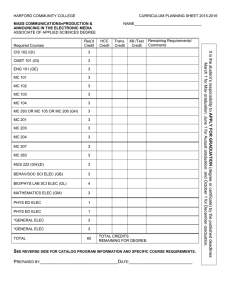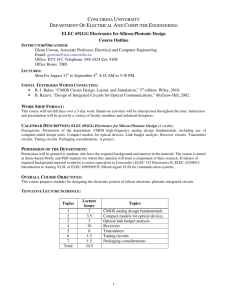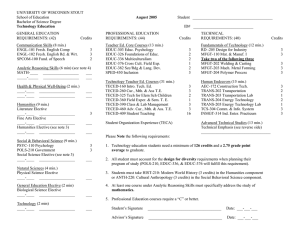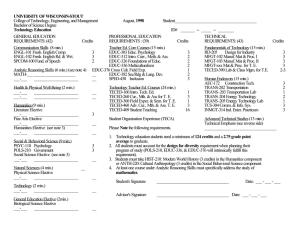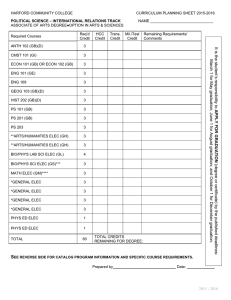BSc (Hons) Electronics with Computer Science - E331
advertisement
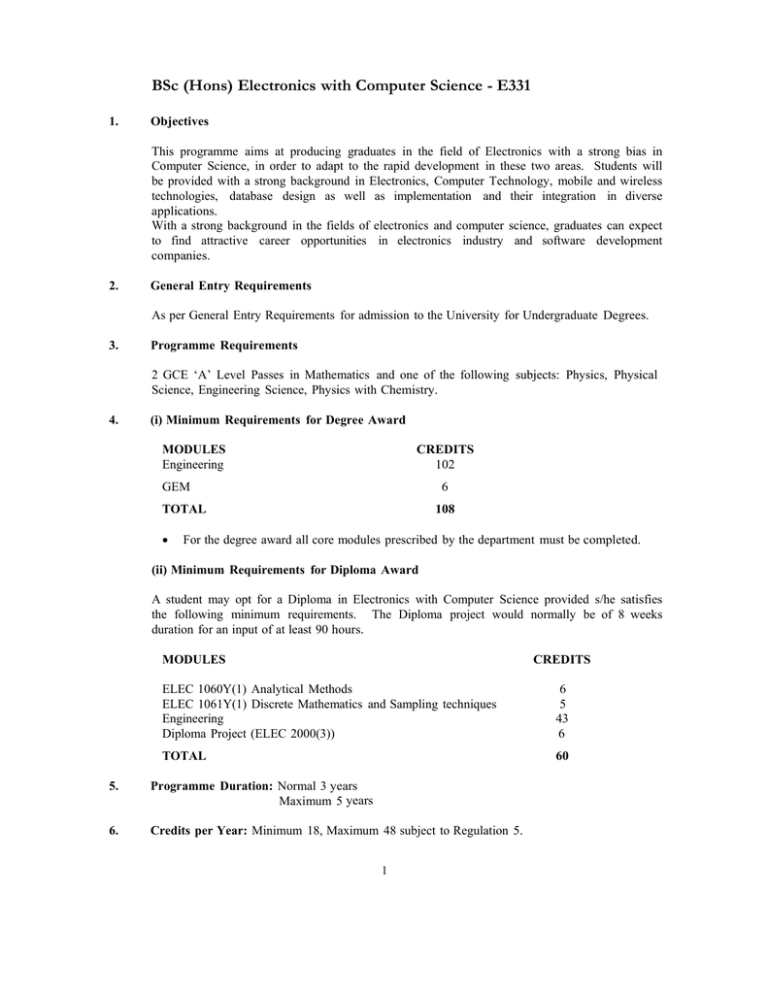
BSc (Hons) Electronics with Computer Science - E331 1. Objectives This programme aims at producing graduates in the field of Electronics with a strong bias in Computer Science, in order to adapt to the rapid development in these two areas. Students will be provided with a strong background in Electronics, Computer Technology, mobile and wireless technologies, database design as well as implementation and their integration in diverse applications. With a strong background in the fields of electronics and computer science, graduates can expect to find attractive career opportunities in electronics industry and software development companies. 2. General Entry Requirements As per General Entry Requirements for admission to the University for Undergraduate Degrees. 3. Programme Requirements 2 GCE ‘A’ Level Passes in Mathematics and one of the following subjects: Physics, Physical Science, Engineering Science, Physics with Chemistry. 4. (i) Minimum Requirements for Degree Award MODULES Engineering CREDITS 102 GEM 6 TOTAL • 108 For the degree award all core modules prescribed by the department must be completed. (ii) Minimum Requirements for Diploma Award A student may opt for a Diploma in Electronics with Computer Science provided s/he satisfies the following minimum requirements. The Diploma project would normally be of 8 weeks duration for an input of at least 90 hours. MODULES CREDITS ELEC 1060Y(1) Analytical Methods ELEC 1061Y(1) Discrete Mathematics and Sampling techniques Engineering Diploma Project (ELEC 2000(3)) 6 5 43 6 TOTAL 60 5. Programme Duration: Normal 3 years Maximum 5 years 6. Credits per Year: Minimum 18, Maximum 48 subject to Regulation 5. 1 7. Assessment Continuous and Written Assessment of Modules Assessment will be based on a written examination of 2 to 3-hour duration (normally a paper of 2 hour duration for modules carrying less or equal to 3.5 credits and 3 hour paper for modules carrying four-six credits) and on continuous assessment done during the semester or year. Written examinations for all modules, whether taught in semester 1 or in semester 2 or both, will be carried out at the end of the academic year (unless otherwise stated). The continuous assessment will count for 20% to 30% of the overall percentage mark of the module(s), except for a Programme where the structure makes for other specific provision(s). Continuous assessment may be based on laboratory work, seminars and/or assignments and should include at least two (2) assignments/ tests per year per module. There will be at least one compulsory class test for all modules taught in semester 1 at the end of semester 1 of the given academic year unless stated otherwise in the Programme Structure. An overall total of 40% for combined assessment and written examination components would be required to pass the module, without minimum thresholds within the individual continuous assessment and written examination. Special examinations (e.g. class tests) will be arranged at the end of semester 1 or semester 2 for exchange students who have registered only for one semester. In case of yearly modules, credits will be assigned on a pro-rata basis. 8. Repeat and Termination of Registration If the CPA of a student is <40% for an academic year, s/he will have to repeat the entire academic year, and retake the modules as and when offered. However, s/he will not be required, if s/he wishes, to retake modules for which Grade C or above has been obtained. Students will be allowed to repeat only once over the entire duration of the Programme of Studies. Registration of a student will be terminated if (i) the CPA < 40% at the end of an academic year and the student has already repeated one year of study; or (ii) the maximum duration allowed for completion of the Programme of Studies has been exceeded; or (iii) If s/he is a year 1 student who has scored a CPA of <25% at the end of an academic year (for yearly programmes). However the Board of Examiners might allow a repeat if there are evidence of compelling circumstances or valid medical grounds. 2 9. List of Modules – BSc (Hons) Electronics with Computer Science CORE MODULES ENGINEERING CSE 1018Y(1) ELEC 1053Y(1) ELEC 1060Y(1) ELEC 1061Y(1) CSE 2010Y(3) ELEC 2055Y(3) CSE 2001Y(5) CSE 2011Y(3) ELEC 2060Y(3) ELEC 2061Y(3) ELEC 2062Y(3) Computer Programming Digital Electronics 1 Analytical Methods Discrete Mathematics and Sampling Techniques Electrical Engineering and Analog Electronics Fundamentals of Computer Science Practical Training/ Software Development Network Computing Analog Communications Software Engineering Database and Information Systems Microprocessors Data and Computer Communications Analog Electronics ELEC 3000(5) ELEC 3055Y(5) ELEC 3060Y(5) Degree Project Power Electronic Systems Digital Communication Systems ELEC 1062Y(1) CSE 1001Y(1) ELEC 1200 Hrs/Wk L+P Credits 1.5+2 2+1 3+0 2.5+0 5 5 6 5 2+2 6 2.5+1 8 weeks 6 0 1.5+2 2+1 2.5+1 2+1 2+1 2+0 2+2 5 5 6 5 5 4 6 2.5+1 2+1 10 6 5 GEM GEM ELECTIVES MATH1111(1) ENGINEERING ELEC 3053Y(5) ELEC 3057Y(5) ELEC 3061Y(5) CSE 3005Y(5) CSE 3006Y(5) CSE 3010Y(5) ELEC 3058Y(5) ELEC 3063Y(5) 3 3 Mathematics 1 D.E 3 Telecommunications Network Discrete Time Signal Processing Broadcasting technologies Artificial Intelligence Operations Research and Simulation Neural Networks, Fuzzy Systems and Genetic Algorithms Digital System design Coding for data transmission 3+0 3+0 3+0 2+2 2+2 2+2 6 6 6 6 6 6 2.5+1 3+0 6 6 NOTE 1: Core module for Diploma: ELEC 2000(3): Diploma Project (6 credits), ELEC 1060Y (1): Analytical Methods, ELEC 1061Y(1) Discrete Mathematics and Sampling NOTE 2: For a student to clear the module ELEC 1200 s/he must obtain Grade S (Satisfactory) in the module. NOTE 3: Students are required to take 6 credits under GEM in the list available at the Faculty's Office. Students are requested to contact their Programme Coordinator before registering for any module under GEM. 3 10. Programme Plan – BSc (Hons) Electronics with Computer Science LEVEL 1 Semester 1 & 2 MODULE CODE CORE ELEC 1053Y(1) ELEC 1060Y(1) ELEC 1061Y(1) ELEC 1062Y(1) CSE 1018Y(1) CSE 1001Y(1) ELEC 1200 Digital Electronics 1 Analytical Methods Discrete Mathematics and Sampling Techniques Electrical Engineering and Analog Electronics Computer Programming Fundamentals of computer science Practical Training/Software Development ELECTIVE MATH 1111(1) Mathematics 1 Hrs/Wk L+P 2+1 3+0 2.5+0 2+2 1.5+2 2.5+1 8 weeks Credits D.E 3 Hrs/Wk L+P Credits 1.5+2 2+1 2.5+1 2+1 2+1 2+0 2+2 5 5 6 5 5 4 6 5 6 5 6 5 6 0 LEVEL 2 Semester 1 & 2 CODE CORE MODULE CSE 2010Y(3) ELEC 2055Y(3) CSE 2001Y(5) CSE 2011Y(3) ELEC 2060Y(3) ELEC 2061Y(3) ELEC 2062Y(3) Network Computing Analog Communications Software Engineering Database and Information Systems Microprocessors Data and Computer Communications Analog Electronics GEM 3 3 GEM LEVEL 3 Semester 1 & 2 CODE CORE ELEC 3000(5) ELEC 3055Y(5) ELEC 3060Y(5) MODULE Degree Project Power Electronic Systems Digital Communication Systems Hrs/Wk L+P Credits 2.5+1 2+1 10 6 5 3+0 3+0 3+0 2+2 2+2 2+2 6 6 6 6 6 6 2.5+1 3+0 6 6 ELECTIVES ENGINEERING ELEC 3053Y(5) ELEC 3057Y(5) ELEC 3061Y(5) CSE 3005Y(5) CSE 3006Y(5) CSE 3010Y(5) ELEC 3058Y(5) ELEC 3063Y(5) Telecommunications Network Discrete Time Signal Processing Broadcasting technologies Artificial Intelligence Operations Research and Simulation Neural Networks, Fuzzy Systems and Genetic Algorithms Digital System Design Coding for data transmission NOTE: Students should take at least two (2) electives in Year 3. 4 Note: Pre-requisite (PR); Pre-requirement (PQ). January 2010 5

